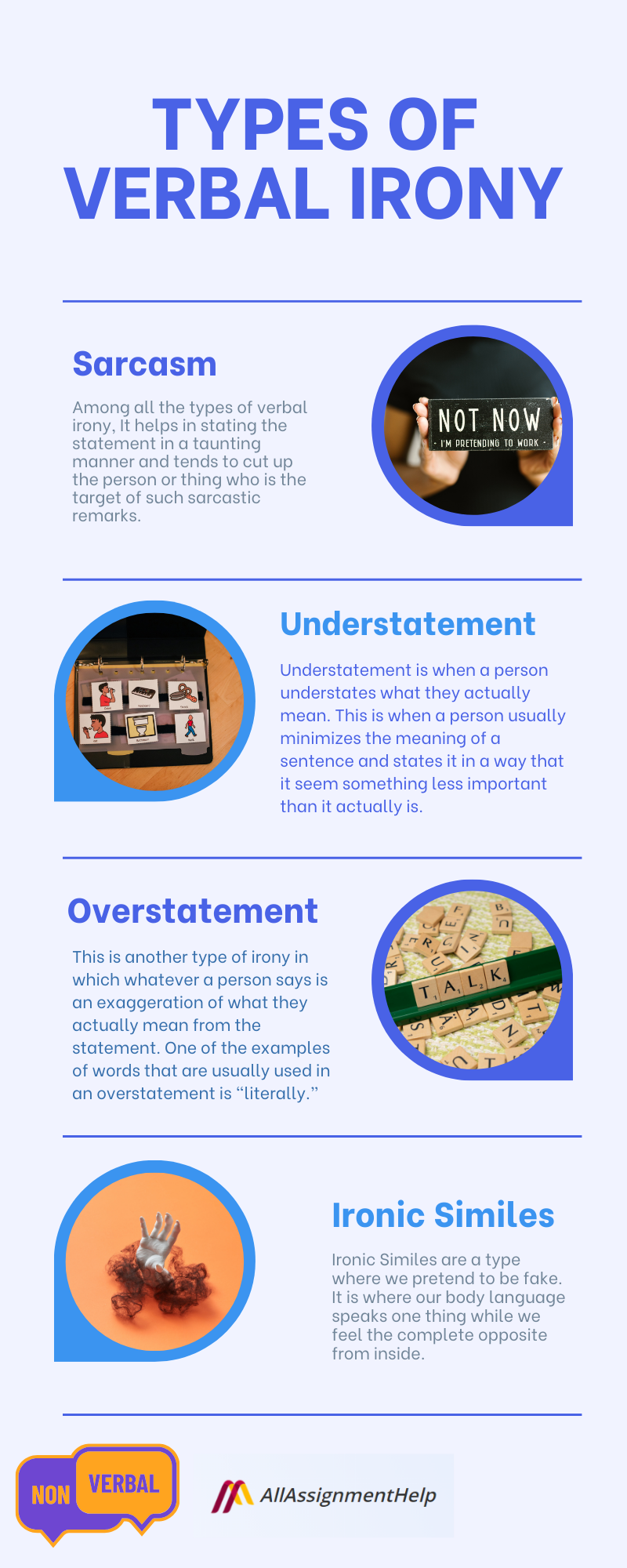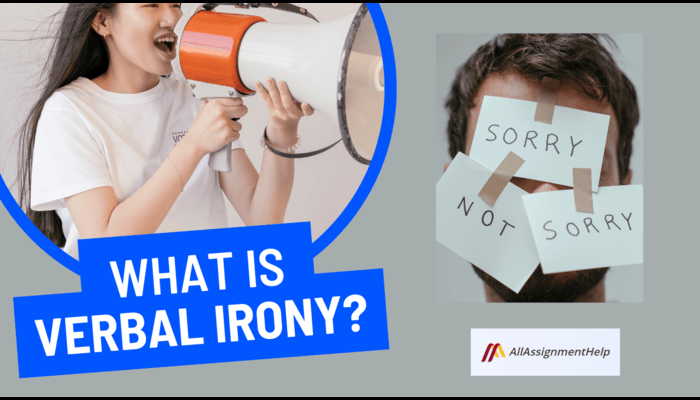Table of Contents
‘Irony’ refers to an expression where you use one word; however, you actually mean the other thing in particular. Irony is a rhetorical device with three different types. Verbal irony, situational irony, and dramatic irony are the three different types of it. Each of these has separate meanings with varied purposes.
Verbal irony is a figure of speech that we often use in our daily lives. Some of us intentionally use it while others use it without any idea. If you are a talented writer, a thorough understanding of different ironies is essential. This write-up is something you need right now to clear up all your confusion about this rhetorical device. In this blog post from the experts of All Assignment Help, we will briefly discuss everything you need to know about verbal irony.
What is Verbal Irony?
In simple words, verbal irony refers to saying one thing but meaning something completely different. Or else we can say that meaning the complete opposite of what we say.
An example of verbal irony to help you understand the concept:
Let’s suppose you and your friend have traveled all the way to see snowfall, but you end up learning that there is no snowfall this year. And suddenly your friend says that I just love this; I got a chance to travel again here. Here you can see that your friend is using verbal irony, as no one would like to go through everything again.
In most cases, people confuse verbal irony with lying. However, this is not the case. Verbal irony is not a lie but is used as sarcasm. Yet again there is a slight difference between these two. Verbal irony definition is just the exact opposite of what you say. Sarcasm refers to mockery where you use certain words with the intention to hurt or mock someone.
If you are a literature student, it is essential to understand the difference between verbal irony and sarcasm. The first one is not negative or a lie, while the other one is used as a negative intention. We hope we have clarified the verbal irony meaning. A thorough understanding of parts of speech and figures of speech is something you must have as a literature student. Moreover, if you have any doubts, you may easily seek assignment help online. Professional experts with in-depth knowledge about the subject can provide the best help and support with your assignments.
Different Types of Verbal Irony
We hope the verbal irony meaning is clear to you. Irony can be used for different purposes. It can express romance, comedy, humor, etc.
Some of the common forms of verbal irony are listed below:

Sarcasm
Among all the types of verbal irony, the first one is sarcasm. It is a word that comes from the Greek word “sarkasmos,” which means to tear the flesh. This word is used in place of verbal irony. It helps in stating the statement in a taunting manner and tends to cut up the person or thing who is the target of such sarcastic remarks.
The term sarcasm is a technical term and is stated in a rhetorical sense and shows the speaker is being critical or is holistic. However, sarcasm is not always bitter and hostile in nature and also has positivity in it when it helps state some positive thing and cover the negative thing. The positivity and negativity of a sentence depend on the tone that is being used in a sentence.
Additionally, there is an argument that shows in some circumstances that sarcasm is actually not a type of verbal irony and differs from each other. It is stated that sarcasm helps in showing foolishness about the other person and is often harsher than the use of verbal irony. Thus, it can be stated that every verbal irony sentence can be sarcastic in nature; however, every sarcastic sentence cannot be verbal irony. This is because verbal irony is not necessarily used with the purpose of ridiculing a person.
Sarcasm is an example used by famous author Oscar Wilde in his prose- “The Importance of Being Earnest” (Note: The title itself is an example of sarcasm).
“I am glad to say that I have never seen a spade. It is obvious that our social spheres have been widely different.”
Understatement
Understatement is when a person understates what they actually mean. This is when a person usually minimizes the meaning of a sentence and states it in a way that it seem something less important than it actually is.
One of the best examples of the word that is usually used in stating an understatement is “no big,” which shows that whatever the case may be, it is not a big deal. Thus, such understatement is also a type of irony that resembles a different meaning of what is being said.
Some of the verbal irony examples of understatement are:
- Someone who has scored top grades in their physics assignment by seeking physics assignment help says, “It is not a big deal for me.” (Here the person has intended the effort to seek online assistance to score top grades. However, he uses the verbal irony understatement to show that it does matter to him, but the truth is different. He wanted it, and he got it done with the help of professional experts online).
- When it is hot as hell and someone says, I don’t understand why people sit in AC the entire day.
- Welcoming people by saying, Welcome to my small house (when you actually reside in a big villa).
- I am not a good cook (You actually are a chef by profession).
Ironic Similes
Ironic Similes are a type where we pretend to be fake. It is where our body language speaks one thing while we feel the complete opposite from the inside.
Some of the examples of this irony include.
- Having a fake smile on the face.
- Pretending to be high in front of others.
- Acting sad to gain sympathy
These are some of the examples of verbal irony where we play cards to convey the wrong message to the audience. These are commonly used by politicians to have a positive impression on the audience and win their votes.
Overstatement
This is another type of irony in which whatever a person says is an exaggeration of what they actually mean from the statement. One of the examples of words that are usually used in an overstatement is “literally.” Most people use this word to exaggerate a sentence and create irony about what they are stating.
Overstatement is derived from the Greek word “hyperbole,” which means hyper to throw. This word is still used in some places to resemble the irony that is being created.
Whether you are writing a literature or English assignment, a good understanding of verbal ironies and figures of speech is required. Hope the below-given examples of verbal irony will provide a thorough understanding of this concept.
Before writing any assignment or essay on verbal irony make sure you use the right meaning, and examples and fulfill its purpose correctly. However, if you don’t have any idea of how to use different verbal ironies in your assignments you may seek online help. You can easily get the best professional online English assignment help or literature assignment help and ensure to submit high-quality assignments with the right usage of poetic devices.
Verbal Irony Examples
Are you looking for example of verbal Irony to understand the term better? Find some of the related examples of verbal irony below
- You have hired online exam helpers with a request such as can you take my online test for me? but the professionals end up missing your deadline. “You end up saying, ” I love missing exam deadlines, and this is why I spend my money on taking such services.”
- When you say, “What a lovely day!” in the middle of a problematic situation.
- Seeing your laptop isn’t working and saying, “Wow! This is fantastic.”
- After a bad day, tell your parents, “My favorite part of the day was when I missed my train and waited for the second one for half an hour.”
- You are not good at mathematics and decided to seek online help with math assignments from a website, but you got scammed in the name of help. You are saying, “Wow! This is the best online coursework service I have ever used. I will surely return here for future assistance.
Understanding verbal irony examples helps distinguish them from sarcasm and exaggeration, refining both writing and communication skills. Whether you are a student or a literature enthusiast, mastering verbal irony will enrich your expressive abilities.
Final Words!
Verbal irony is a powerful rhetorical device that adds depth to conversations, literature, and daily interactions. Unlike lies or deception, verbal irony is an intentional expression where the speaker conveys a meaning opposite to their words. From sarcasm to ironic similes, it enhances humor, critique, and dramatic effect.
Ironies are used in speeches and plays, and with a strong understanding of their usage and purpose, you may write the best plays in your university. Moreover, if you are with your plays and don’t have time to concentrate on your pending online classes, hire experts for your assistance. You may pay someone to do your online class and to ensure clarity and accuracy in your work.
Frequently Asked Questions
Question: What is a verbal irony?
Answer: In simple words, verbal irony refers to saying one thing but meaning something completely different. Or else we can say that meaning the complete opposite of what we say.
Question: Is verbal irony sarcasm or lie?
Answer: In most cases, people confuse verbal irony with lying. However, this is not the case. Verbal irony is not a lie but is used as sarcasm.
Question: What are the different examples of verbal irony?
Verbal irony is something that is done intentionally with no purpose to deceive others. It can be sarcasm but is not a lie or falsehood.
Question: What is an example of verbal irony in understatement?
Someone stuck in bad traffic for hours says, “I am not that bad.” (Here they use verbal irony to downplay their stress or sadness.)
